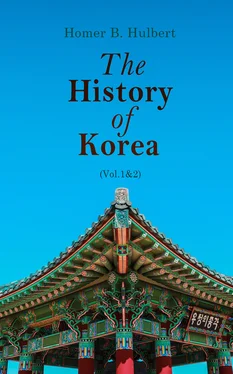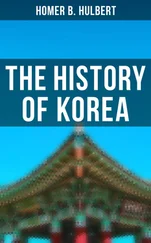Nothing now lay between the invading army and universal rapine. The army penetrated far into the territory of Koryŭ, cut off 30,000 heads and ravaged right and left.
When Gen. Kang Cho and Gen. Yi Hyŭn-un were brought before the Kitan emperor the bonds of the former were cut and he was bidden to stand forth. “Will you become my subject?” “I am a Koryŭ man. How can I be your subject?” They cut his flesh with knives but he remained firm. When the same question was put to Gen. Yi Hyŭn-un he replied:he replied: “As I now look upon the sun and moon, how can I remember any lesser light?” Such were the words of his apostacy. Kang Cho cried out upon him as a traitor, and then bowed his head to the axe.
The Kitan army was now in full march on P‘yŭng-yang, but the broken remnants of the Koryŭ army united at “Long Neck Pass” and successfully opposed the progress of the invaders. A little diplomacy was now made use of by the Kitan general. He sent a letter to Heung-wha camp, purporting to be from Kang Cho, ordering them to surrender, but the commander, Yang Kyu, replied “I listen only to the king.”
Kwak-ju (now Kwak-san) and Suk-ju (now Suk ch‘ŭn) fell in quick succession and soon the victorious army of Kitan was thundering at the gates of P‘yŭng-yang. The general in command was Wŭn Chong-sŭk and his two lieutenants were Chi Ch‘oa-mun and Ch‘oé Ch‘ang. The commander was willing to surrender without a fight and went so far as to write out the surrender, but the other two prevented this by seizing the paper, tearing it up and putting the Kitan messenger to death. The camp of these generals was without the city, but the panic of the people inside increased to such an extent that all the forces entered the city to insure quiet.
The Kitan general-in-chief now received from the king an offer of surrender. It caused the greatest satisfaction in the Kitan camp and orders were given that the soldiers should cease ravaging the surrounding country. Ma Po-u was sent as Kitan commissioner in Song-do and was accompanied by an escort of a thousand men under the command of Gen. Eul Neum.
We can see how little connection there was between the capital and the army in the field by the fact that this submission on the part of the king did not lead to the surrender of P‘yŭng-yang nor to a cessation of hostilities by the generals who commanded the forces there. When a second messenger was sent into the city to ask why the former one did not return he too was put to death.
Gen. Eul Neum was ordered to reduce P‘yŭng-yang and he approached to attack it but was driven back with a loss of 3,000 men. This attempt failing, the conquerorsconquerors decided to lay siege to the town. When the inmates saw this they knew that the end was near. A plan was made whereby a part of the troops should make a sally from the West Gate and another part from the East Gate and together they hoped to dislodge the enemy. But one of the generals, instead of following out the plan, improved the opportunity to make good his escape. The other party was therefore in a trap and had to surrender. But still two generals held the city.
Meanwhile a band of 1,000 soldiers under Gen. Yang Kyu attacked Kwak-ju by night, and put the Kitan garrison to the sword, and took seven thousand people away to Tong-bu for safety.
When the Kitan forces found they were likely to have difficulty in bringing P‘yŭng-yang to terms they gave it up and marched away eastward. Thereupon the general Chi Ch‘oa-mun hastened to Song-do and announced that he had fled from P‘yŭng-yang. The “residency” of Ma Po-u seems to have been a short-lived one and terminated when it was found that the submission of the king amounted to little when the armies would not surrender. Courtiers urged an immediate surrender but Gen. Kang Kam-ch‘an said “If we could put them off a while and gain time they would be gradually worn out. The king should move south out of harm’s way for a time.” So that very night the king and queen and a large number of officials together with 5,000 troops moved southward to Chŭk-sŭng. The king’s southward flight was by no means an easy one. The very first night out from the capital the house where he slept was attacked by a band of traitors and malcontents. The king escaped to the mountains where he was attended by the faithful Gen. Chi. From this retreat he recalled the two generals who had been banished for attacking Yŭ-jin without orders, and restored them to their positions. Escorted by Generals Chi, Ch‘o and Chu, the king slowly retreated toward Wang-ju. All his numerous escort had left him excepting his two wives, two palace women and two intimate friends. Gen. Chi kept a sharp lookout for the bands of robbers who were roaming about the country. Once when hard pressed by these irresponsible gentry, Gen. Chi spirited the king away under cover of night and concealed him in To-bong monastery in Yang-ju a little to the northeast of the present Seoul, and the robbers were thrown completely off the scent.
Gen. Ha Kong-jin told the king that the Kitan forces had invaded Koryŭ for the purpose of punishing Gen. Kang Bho, and as this had been accomplished all difficulty between Koryŭ and Kitan could be easily settled by a letter from the king to his northern suzerain. The letter was written and sent by the hand of a trusty man. It said that the king had left Song-do for an expedition into the country to quell certain disturbances there. When the messenger was asked how far the king had gone he answered that he had gone several thousand li . This seemed plausible to the Kitan court and soon its army was working its way slowly back to the boundary, the first stop being made at Ch‘ang-wha.
This retreat was more with a view to obtaining a wintering place than with a desire to favor Koryŭ, for no sooner had the next season, 1011, come than the Kitan army marched straight down through the peninsula and entered the capital and burned the palaces and most of the common houses. The king was in Kwang-ju but, learning of this disaster, he hurried still further south with his two wives to Ch‘ŭn-an in the present Ch‘ung-ch‘ŭng Province. From there he continued south to Chŭn-ju where he was treated very cavalierly by the governor who met him in common clothes and without the ceremony befitting a royal visitor. In fact this governor had determined to put the king out of the way. To this end he hired three men to go by night and assassinate him. But the door was guarded by Gen. Chi who bolted it firmly and then mounted the roof and cried loudly to all who were loyal to the king to rally round him. The next day the governor was summoned before the king. Some of the generals were clamorous for his death but Gen. Chi who was as wise as he was faithful vetoed this, for the king was not in a position to face the opposition that the execution of the governor would arouse in the province. It will be remembered that Wang-gön had left command that as the south was disaffected none of his descendants should marry among its people. This shows that the king when he went south found it unwise to exercise all the prerogatives of royalty. So the governor was left intact and the king moved further south to Na-ju.
Meanwhile the Kitan forces were not having it all their own way in the north. Gen. Kim Suk-heung of Kwi-ju attacked a powerful force of the enemy and secured a signal victory. It is said that he put 10,000 men to death. Then Gen. Yang Kyu made a dash at the enemy at Mu-ro-da near Eui-ju and killed 2,000 and recovered 3,000 prisoners. Also at Yi-su there was a battle in which 2,500 Kitan men were killed and 1,000 captives rescued. At Yo-ri-ch‘ŭn also 1,000 more were killed. These three desperate engagements occurred on the same day.
Gen. Ha Kong-jin was at this time a hostage in the Kitan capital, and he managed to send a letter to the King informing him that the forces of Kitan were slowly retreating. This made it possible for the king to start on his way back to the capital. The first stage was to Chŭn-ju.
Читать дальше












